Commercial Law Assignment: Share Issues and Directors' Duties
VerifiedAdded on 2022/09/06
|10
|2391
|23
Homework Assignment
AI Summary
This Commercial Law assignment addresses key aspects of the Corporations Act 2001. Question 1 examines the requirements for raising funds through a share issue, focusing on the need for a prospectus and the directors' responsibilities regarding disclosure and misleading information. Question 2 delves into share buy-back regulations, including selective buy-backs and equal access buy-backs, and the required procedures and considerations. Question 3 explores the role and obligations of nominee directors, referencing relevant case law such as Levin v Clark and Chew v The Queen, and the importance of acting in the company's best interests. Question 4 analyzes director's duties regarding material personal interests and the standard of care and diligence, including the application of section 191 and section 180(1) of the Corporations Act, and the relevance of cases like Regal (Hastings) Ltd v Gulliver and Daniels v AWA Ltd. The assignment provides comprehensive solutions to each question, offering valuable insights into corporate law principles.
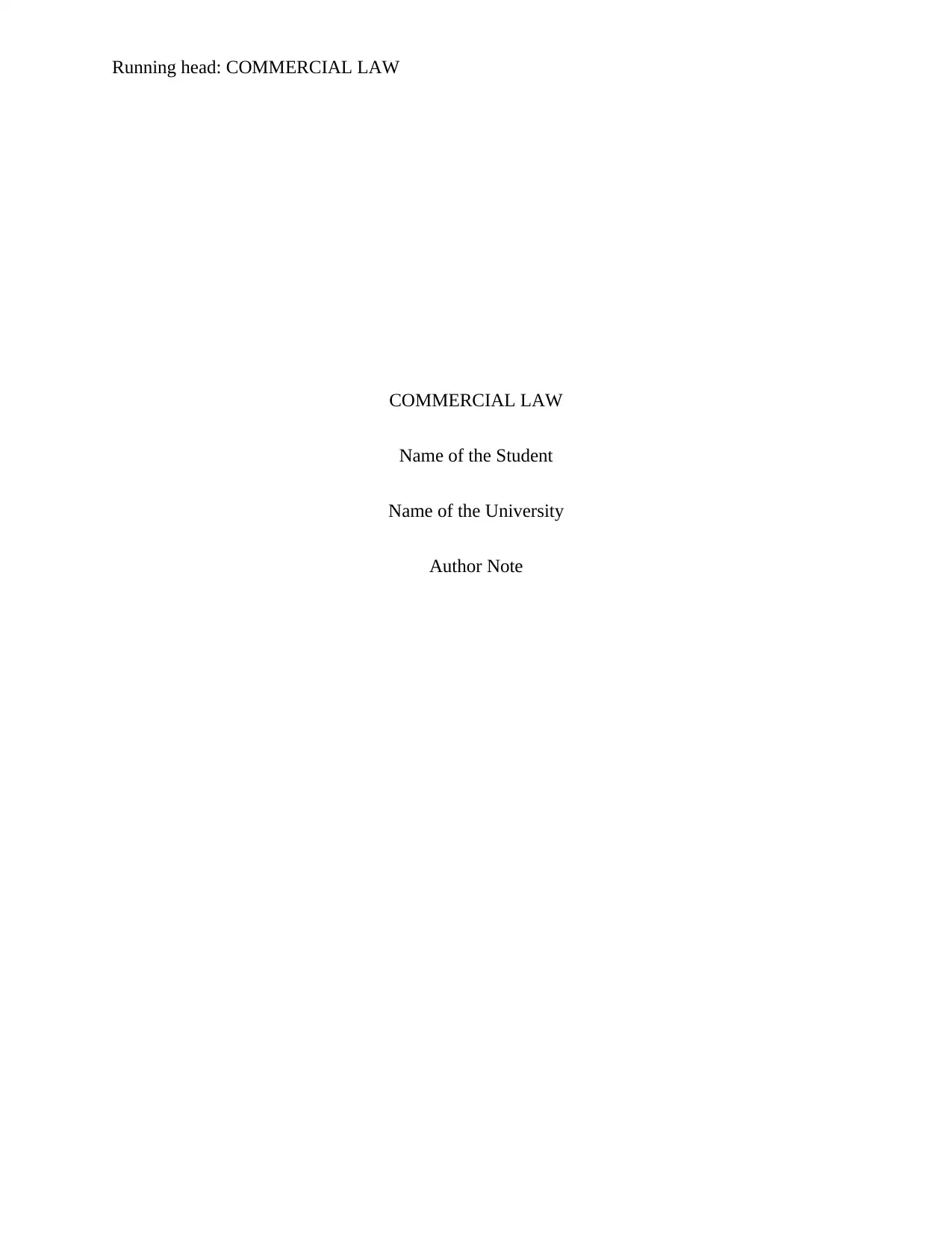
Running head: COMMERCIAL LAW
COMMERCIAL LAW
Name of the Student
Name of the University
Author Note
COMMERCIAL LAW
Name of the Student
Name of the University
Author Note
Paraphrase This Document
Need a fresh take? Get an instant paraphrase of this document with our AI Paraphraser
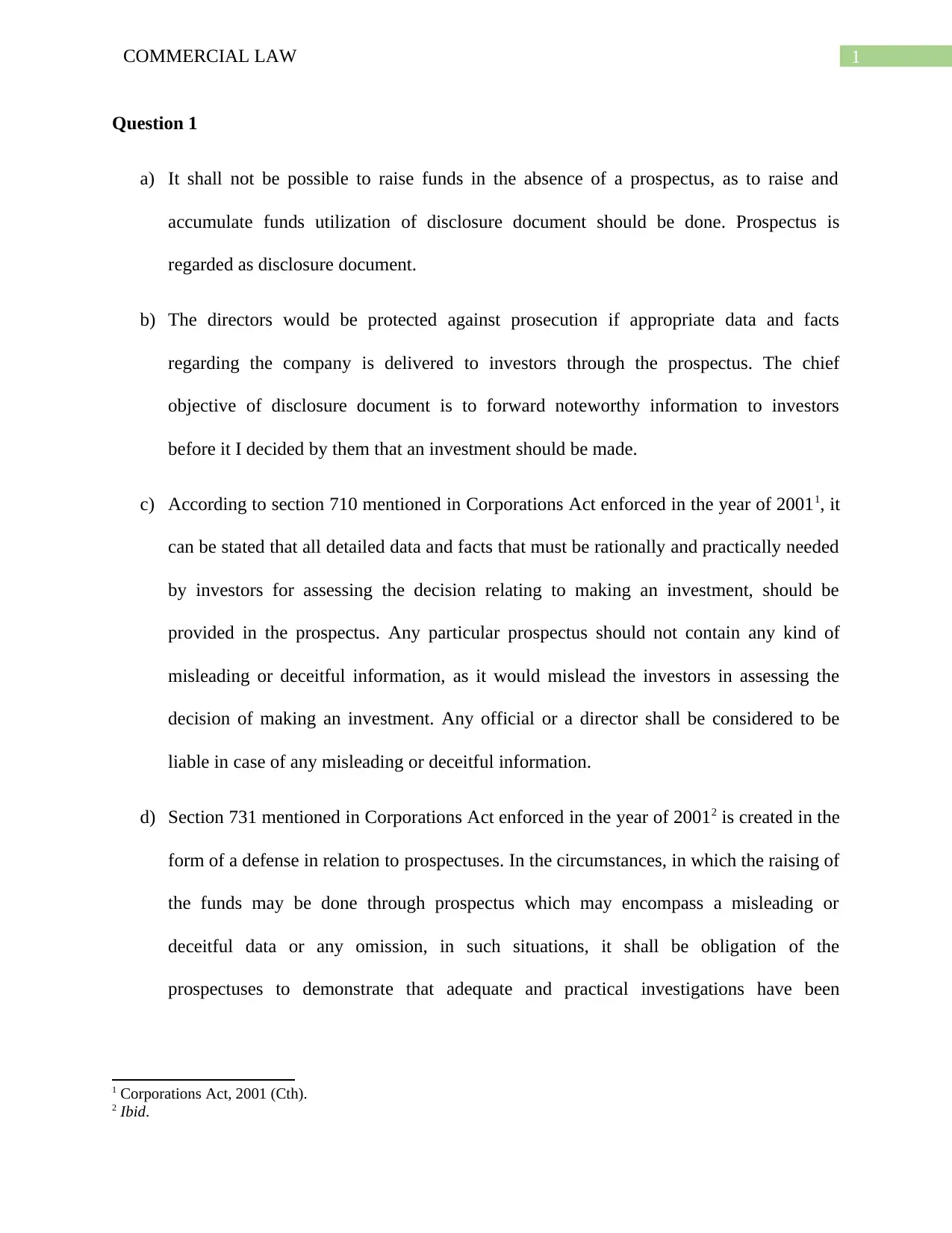
1COMMERCIAL LAW
Question 1
a) It shall not be possible to raise funds in the absence of a prospectus, as to raise and
accumulate funds utilization of disclosure document should be done. Prospectus is
regarded as disclosure document.
b) The directors would be protected against prosecution if appropriate data and facts
regarding the company is delivered to investors through the prospectus. The chief
objective of disclosure document is to forward noteworthy information to investors
before it I decided by them that an investment should be made.
c) According to section 710 mentioned in Corporations Act enforced in the year of 20011, it
can be stated that all detailed data and facts that must be rationally and practically needed
by investors for assessing the decision relating to making an investment, should be
provided in the prospectus. Any particular prospectus should not contain any kind of
misleading or deceitful information, as it would mislead the investors in assessing the
decision of making an investment. Any official or a director shall be considered to be
liable in case of any misleading or deceitful information.
d) Section 731 mentioned in Corporations Act enforced in the year of 20012 is created in the
form of a defense in relation to prospectuses. In the circumstances, in which the raising of
the funds may be done through prospectus which may encompass a misleading or
deceitful data or any omission, in such situations, it shall be obligation of the
prospectuses to demonstrate that adequate and practical investigations have been
1 Corporations Act, 2001 (Cth).
2 Ibid.
Question 1
a) It shall not be possible to raise funds in the absence of a prospectus, as to raise and
accumulate funds utilization of disclosure document should be done. Prospectus is
regarded as disclosure document.
b) The directors would be protected against prosecution if appropriate data and facts
regarding the company is delivered to investors through the prospectus. The chief
objective of disclosure document is to forward noteworthy information to investors
before it I decided by them that an investment should be made.
c) According to section 710 mentioned in Corporations Act enforced in the year of 20011, it
can be stated that all detailed data and facts that must be rationally and practically needed
by investors for assessing the decision relating to making an investment, should be
provided in the prospectus. Any particular prospectus should not contain any kind of
misleading or deceitful information, as it would mislead the investors in assessing the
decision of making an investment. Any official or a director shall be considered to be
liable in case of any misleading or deceitful information.
d) Section 731 mentioned in Corporations Act enforced in the year of 20012 is created in the
form of a defense in relation to prospectuses. In the circumstances, in which the raising of
the funds may be done through prospectus which may encompass a misleading or
deceitful data or any omission, in such situations, it shall be obligation of the
prospectuses to demonstrate that adequate and practical investigations have been
1 Corporations Act, 2001 (Cth).
2 Ibid.
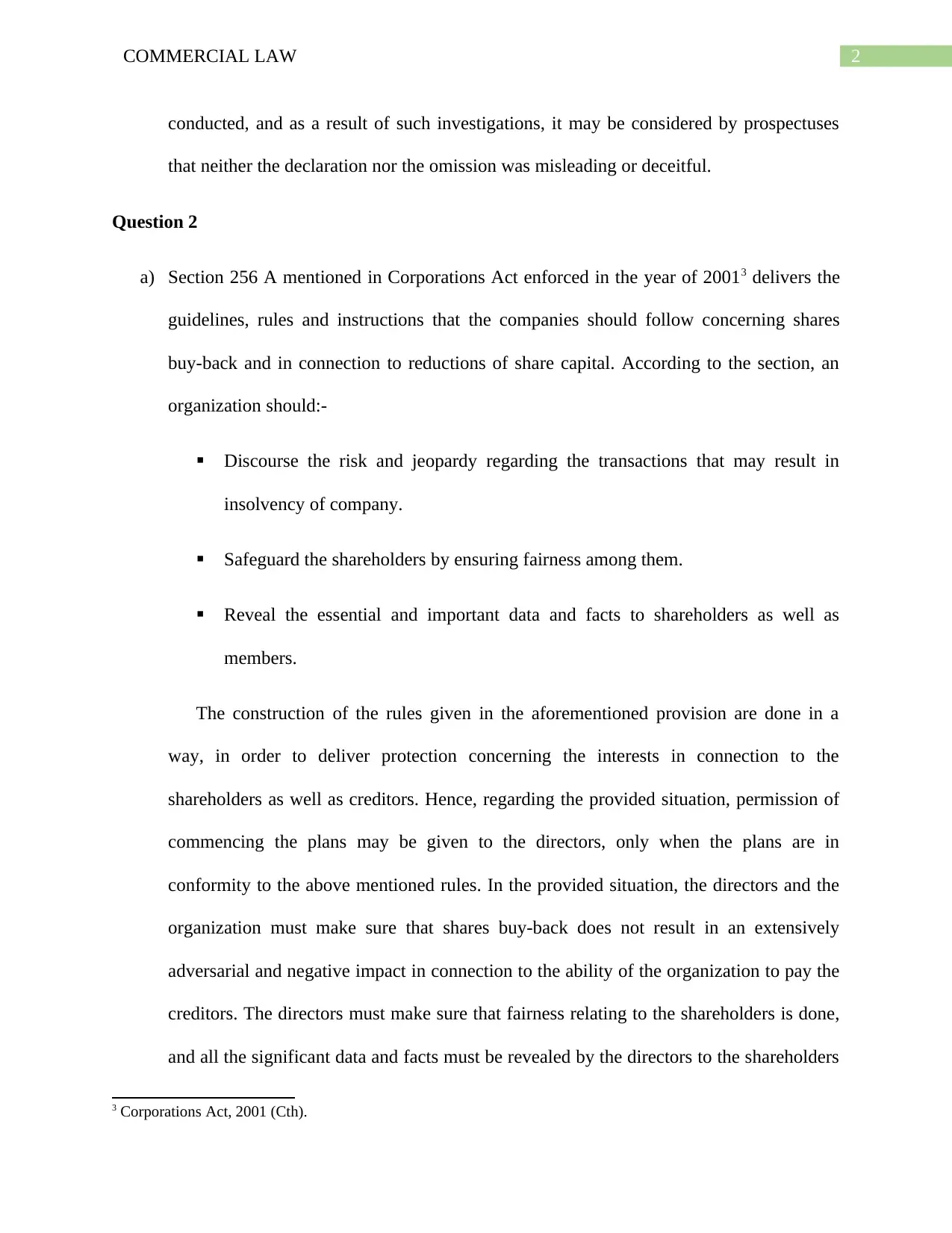
2COMMERCIAL LAW
conducted, and as a result of such investigations, it may be considered by prospectuses
that neither the declaration nor the omission was misleading or deceitful.
Question 2
a) Section 256 A mentioned in Corporations Act enforced in the year of 20013 delivers the
guidelines, rules and instructions that the companies should follow concerning shares
buy-back and in connection to reductions of share capital. According to the section, an
organization should:-
Discourse the risk and jeopardy regarding the transactions that may result in
insolvency of company.
Safeguard the shareholders by ensuring fairness among them.
Reveal the essential and important data and facts to shareholders as well as
members.
The construction of the rules given in the aforementioned provision are done in a
way, in order to deliver protection concerning the interests in connection to the
shareholders as well as creditors. Hence, regarding the provided situation, permission of
commencing the plans may be given to the directors, only when the plans are in
conformity to the above mentioned rules. In the provided situation, the directors and the
organization must make sure that shares buy-back does not result in an extensively
adversarial and negative impact in connection to the ability of the organization to pay the
creditors. The directors must make sure that fairness relating to the shareholders is done,
and all the significant data and facts must be revealed by the directors to the shareholders
3 Corporations Act, 2001 (Cth).
conducted, and as a result of such investigations, it may be considered by prospectuses
that neither the declaration nor the omission was misleading or deceitful.
Question 2
a) Section 256 A mentioned in Corporations Act enforced in the year of 20013 delivers the
guidelines, rules and instructions that the companies should follow concerning shares
buy-back and in connection to reductions of share capital. According to the section, an
organization should:-
Discourse the risk and jeopardy regarding the transactions that may result in
insolvency of company.
Safeguard the shareholders by ensuring fairness among them.
Reveal the essential and important data and facts to shareholders as well as
members.
The construction of the rules given in the aforementioned provision are done in a
way, in order to deliver protection concerning the interests in connection to the
shareholders as well as creditors. Hence, regarding the provided situation, permission of
commencing the plans may be given to the directors, only when the plans are in
conformity to the above mentioned rules. In the provided situation, the directors and the
organization must make sure that shares buy-back does not result in an extensively
adversarial and negative impact in connection to the ability of the organization to pay the
creditors. The directors must make sure that fairness relating to the shareholders is done,
and all the significant data and facts must be revealed by the directors to the shareholders
3 Corporations Act, 2001 (Cth).
⊘ This is a preview!⊘
Do you want full access?
Subscribe today to unlock all pages.

Trusted by 1+ million students worldwide
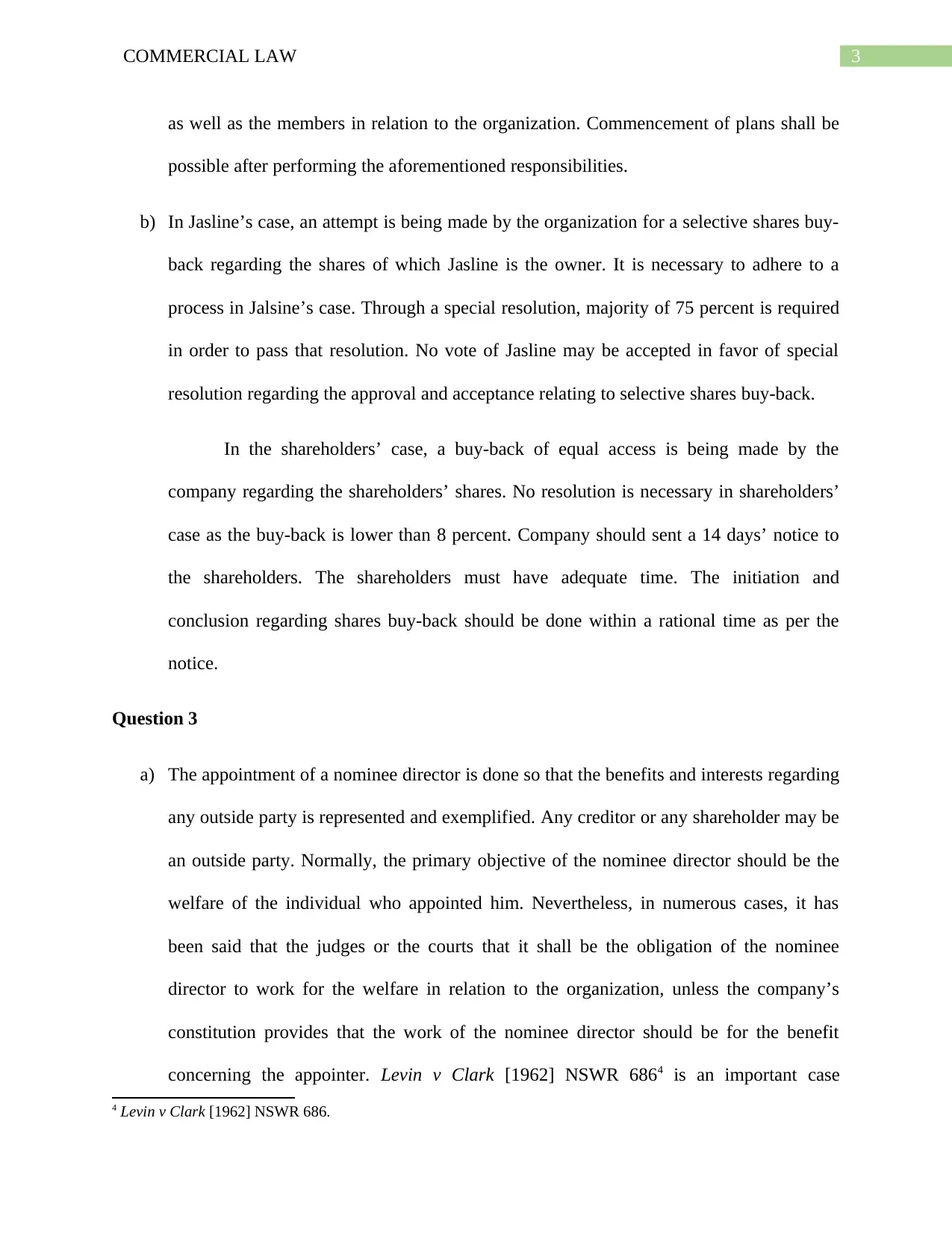
3COMMERCIAL LAW
as well as the members in relation to the organization. Commencement of plans shall be
possible after performing the aforementioned responsibilities.
b) In Jasline’s case, an attempt is being made by the organization for a selective shares buy-
back regarding the shares of which Jasline is the owner. It is necessary to adhere to a
process in Jalsine’s case. Through a special resolution, majority of 75 percent is required
in order to pass that resolution. No vote of Jasline may be accepted in favor of special
resolution regarding the approval and acceptance relating to selective shares buy-back.
In the shareholders’ case, a buy-back of equal access is being made by the
company regarding the shareholders’ shares. No resolution is necessary in shareholders’
case as the buy-back is lower than 8 percent. Company should sent a 14 days’ notice to
the shareholders. The shareholders must have adequate time. The initiation and
conclusion regarding shares buy-back should be done within a rational time as per the
notice.
Question 3
a) The appointment of a nominee director is done so that the benefits and interests regarding
any outside party is represented and exemplified. Any creditor or any shareholder may be
an outside party. Normally, the primary objective of the nominee director should be the
welfare of the individual who appointed him. Nevertheless, in numerous cases, it has
been said that the judges or the courts that it shall be the obligation of the nominee
director to work for the welfare in relation to the organization, unless the company’s
constitution provides that the work of the nominee director should be for the benefit
concerning the appointer. Levin v Clark [1962] NSWR 6864 is an important case
4 Levin v Clark [1962] NSWR 686.
as well as the members in relation to the organization. Commencement of plans shall be
possible after performing the aforementioned responsibilities.
b) In Jasline’s case, an attempt is being made by the organization for a selective shares buy-
back regarding the shares of which Jasline is the owner. It is necessary to adhere to a
process in Jalsine’s case. Through a special resolution, majority of 75 percent is required
in order to pass that resolution. No vote of Jasline may be accepted in favor of special
resolution regarding the approval and acceptance relating to selective shares buy-back.
In the shareholders’ case, a buy-back of equal access is being made by the
company regarding the shareholders’ shares. No resolution is necessary in shareholders’
case as the buy-back is lower than 8 percent. Company should sent a 14 days’ notice to
the shareholders. The shareholders must have adequate time. The initiation and
conclusion regarding shares buy-back should be done within a rational time as per the
notice.
Question 3
a) The appointment of a nominee director is done so that the benefits and interests regarding
any outside party is represented and exemplified. Any creditor or any shareholder may be
an outside party. Normally, the primary objective of the nominee director should be the
welfare of the individual who appointed him. Nevertheless, in numerous cases, it has
been said that the judges or the courts that it shall be the obligation of the nominee
director to work for the welfare in relation to the organization, unless the company’s
constitution provides that the work of the nominee director should be for the benefit
concerning the appointer. Levin v Clark [1962] NSWR 6864 is an important case
4 Levin v Clark [1962] NSWR 686.
Paraphrase This Document
Need a fresh take? Get an instant paraphrase of this document with our AI Paraphraser
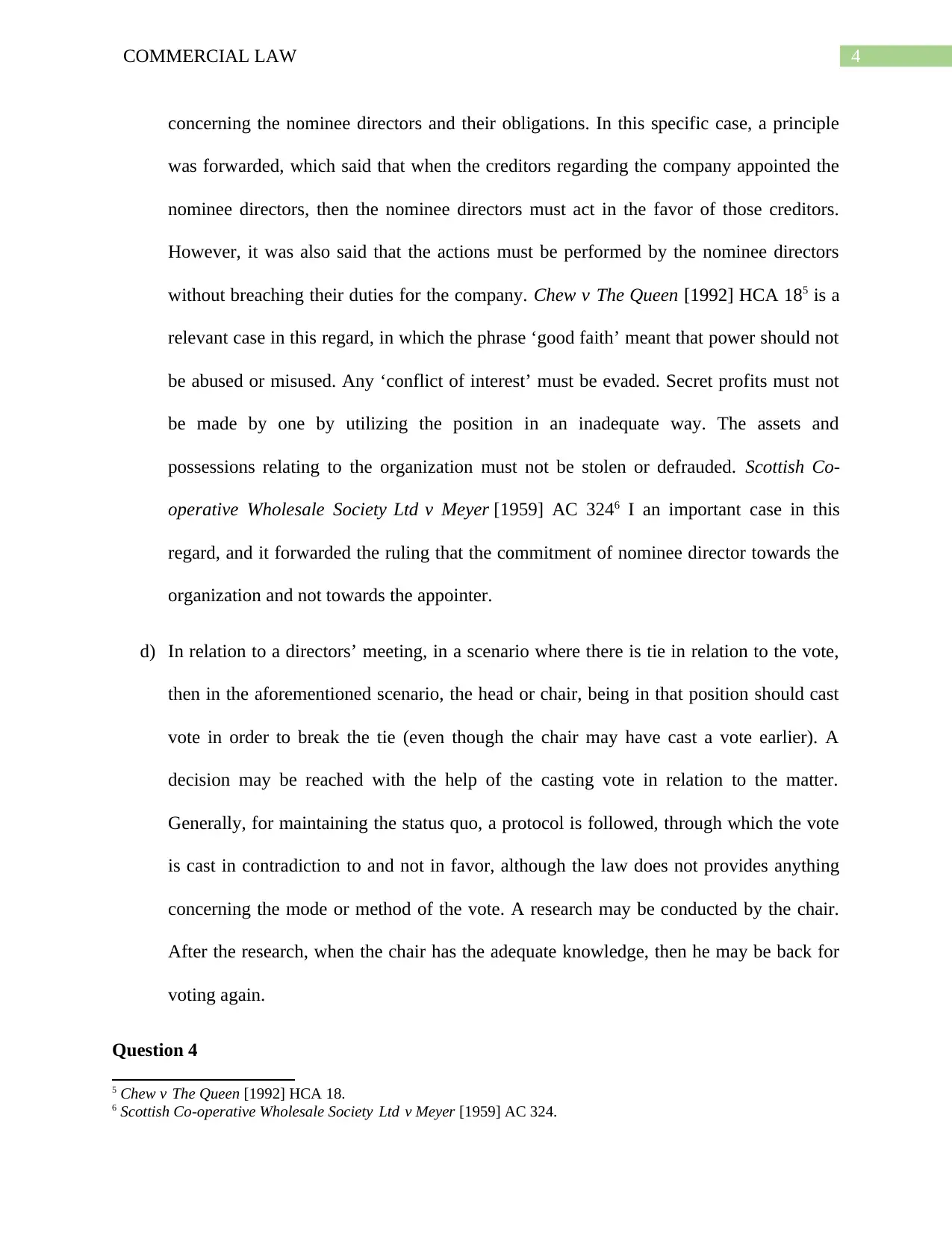
4COMMERCIAL LAW
concerning the nominee directors and their obligations. In this specific case, a principle
was forwarded, which said that when the creditors regarding the company appointed the
nominee directors, then the nominee directors must act in the favor of those creditors.
However, it was also said that the actions must be performed by the nominee directors
without breaching their duties for the company. Chew v The Queen [1992] HCA 185 is a
relevant case in this regard, in which the phrase ‘good faith’ meant that power should not
be abused or misused. Any ‘conflict of interest’ must be evaded. Secret profits must not
be made by one by utilizing the position in an inadequate way. The assets and
possessions relating to the organization must not be stolen or defrauded. Scottish Co-
operative Wholesale Society Ltd v Meyer [1959] AC 3246 I an important case in this
regard, and it forwarded the ruling that the commitment of nominee director towards the
organization and not towards the appointer.
d) In relation to a directors’ meeting, in a scenario where there is tie in relation to the vote,
then in the aforementioned scenario, the head or chair, being in that position should cast
vote in order to break the tie (even though the chair may have cast a vote earlier). A
decision may be reached with the help of the casting vote in relation to the matter.
Generally, for maintaining the status quo, a protocol is followed, through which the vote
is cast in contradiction to and not in favor, although the law does not provides anything
concerning the mode or method of the vote. A research may be conducted by the chair.
After the research, when the chair has the adequate knowledge, then he may be back for
voting again.
Question 4
5 Chew v The Queen [1992] HCA 18.
6 Scottish Co-operative Wholesale Society Ltd v Meyer [1959] AC 324.
concerning the nominee directors and their obligations. In this specific case, a principle
was forwarded, which said that when the creditors regarding the company appointed the
nominee directors, then the nominee directors must act in the favor of those creditors.
However, it was also said that the actions must be performed by the nominee directors
without breaching their duties for the company. Chew v The Queen [1992] HCA 185 is a
relevant case in this regard, in which the phrase ‘good faith’ meant that power should not
be abused or misused. Any ‘conflict of interest’ must be evaded. Secret profits must not
be made by one by utilizing the position in an inadequate way. The assets and
possessions relating to the organization must not be stolen or defrauded. Scottish Co-
operative Wholesale Society Ltd v Meyer [1959] AC 3246 I an important case in this
regard, and it forwarded the ruling that the commitment of nominee director towards the
organization and not towards the appointer.
d) In relation to a directors’ meeting, in a scenario where there is tie in relation to the vote,
then in the aforementioned scenario, the head or chair, being in that position should cast
vote in order to break the tie (even though the chair may have cast a vote earlier). A
decision may be reached with the help of the casting vote in relation to the matter.
Generally, for maintaining the status quo, a protocol is followed, through which the vote
is cast in contradiction to and not in favor, although the law does not provides anything
concerning the mode or method of the vote. A research may be conducted by the chair.
After the research, when the chair has the adequate knowledge, then he may be back for
voting again.
Question 4
5 Chew v The Queen [1992] HCA 18.
6 Scottish Co-operative Wholesale Society Ltd v Meyer [1959] AC 324.
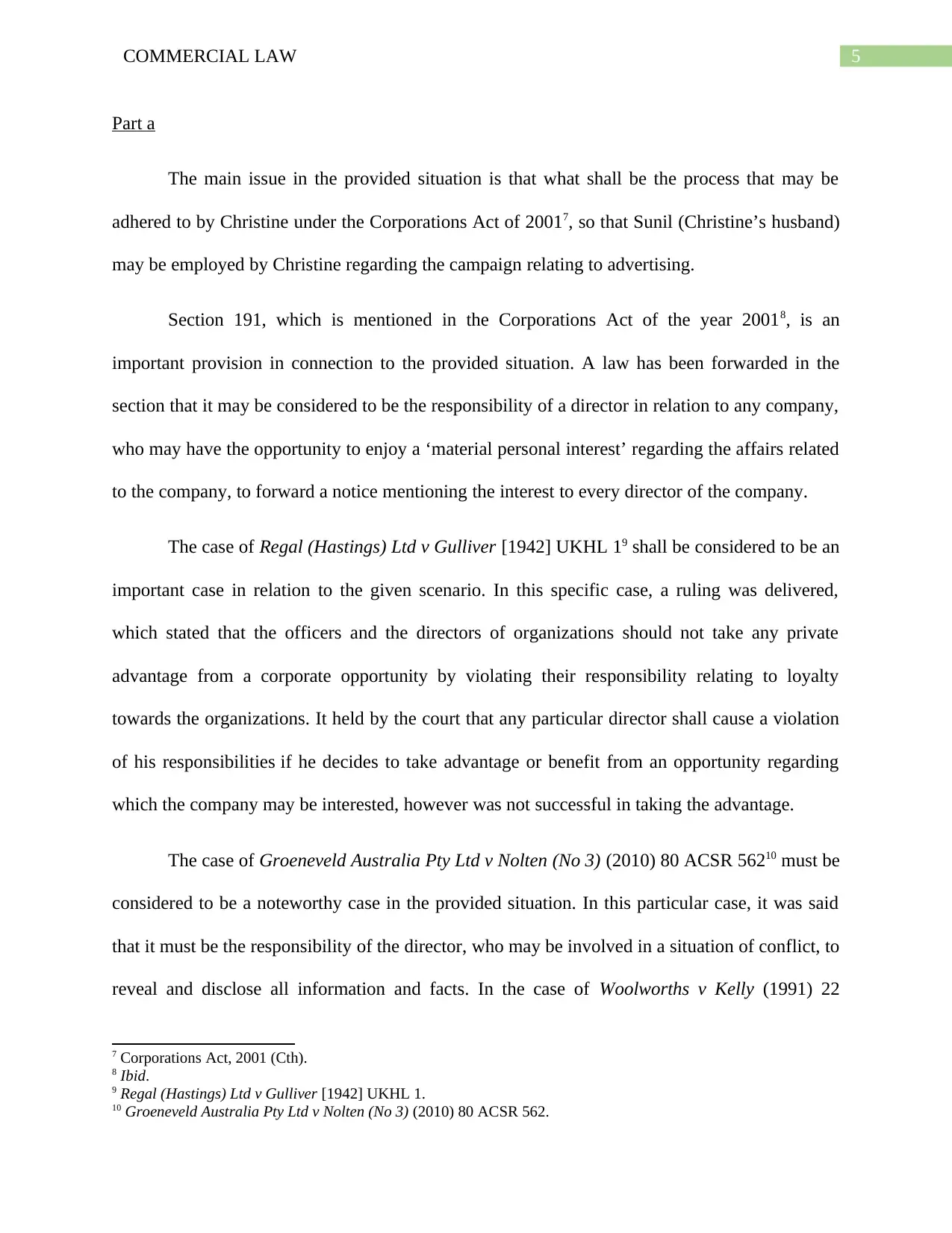
5COMMERCIAL LAW
Part a
The main issue in the provided situation is that what shall be the process that may be
adhered to by Christine under the Corporations Act of 20017, so that Sunil (Christine’s husband)
may be employed by Christine regarding the campaign relating to advertising.
Section 191, which is mentioned in the Corporations Act of the year 20018, is an
important provision in connection to the provided situation. A law has been forwarded in the
section that it may be considered to be the responsibility of a director in relation to any company,
who may have the opportunity to enjoy a ‘material personal interest’ regarding the affairs related
to the company, to forward a notice mentioning the interest to every director of the company.
The case of Regal (Hastings) Ltd v Gulliver [1942] UKHL 19 shall be considered to be an
important case in relation to the given scenario. In this specific case, a ruling was delivered,
which stated that the officers and the directors of organizations should not take any private
advantage from a corporate opportunity by violating their responsibility relating to loyalty
towards the organizations. It held by the court that any particular director shall cause a violation
of his responsibilities if he decides to take advantage or benefit from an opportunity regarding
which the company may be interested, however was not successful in taking the advantage.
The case of Groeneveld Australia Pty Ltd v Nolten (No 3) (2010) 80 ACSR 56210 must be
considered to be a noteworthy case in the provided situation. In this particular case, it was said
that it must be the responsibility of the director, who may be involved in a situation of conflict, to
reveal and disclose all information and facts. In the case of Woolworths v Kelly (1991) 22
7 Corporations Act, 2001 (Cth).
8 Ibid.
9 Regal (Hastings) Ltd v Gulliver [1942] UKHL 1.
10 Groeneveld Australia Pty Ltd v Nolten (No 3) (2010) 80 ACSR 562.
Part a
The main issue in the provided situation is that what shall be the process that may be
adhered to by Christine under the Corporations Act of 20017, so that Sunil (Christine’s husband)
may be employed by Christine regarding the campaign relating to advertising.
Section 191, which is mentioned in the Corporations Act of the year 20018, is an
important provision in connection to the provided situation. A law has been forwarded in the
section that it may be considered to be the responsibility of a director in relation to any company,
who may have the opportunity to enjoy a ‘material personal interest’ regarding the affairs related
to the company, to forward a notice mentioning the interest to every director of the company.
The case of Regal (Hastings) Ltd v Gulliver [1942] UKHL 19 shall be considered to be an
important case in relation to the given scenario. In this specific case, a ruling was delivered,
which stated that the officers and the directors of organizations should not take any private
advantage from a corporate opportunity by violating their responsibility relating to loyalty
towards the organizations. It held by the court that any particular director shall cause a violation
of his responsibilities if he decides to take advantage or benefit from an opportunity regarding
which the company may be interested, however was not successful in taking the advantage.
The case of Groeneveld Australia Pty Ltd v Nolten (No 3) (2010) 80 ACSR 56210 must be
considered to be a noteworthy case in the provided situation. In this particular case, it was said
that it must be the responsibility of the director, who may be involved in a situation of conflict, to
reveal and disclose all information and facts. In the case of Woolworths v Kelly (1991) 22
7 Corporations Act, 2001 (Cth).
8 Ibid.
9 Regal (Hastings) Ltd v Gulliver [1942] UKHL 1.
10 Groeneveld Australia Pty Ltd v Nolten (No 3) (2010) 80 ACSR 562.
⊘ This is a preview!⊘
Do you want full access?
Subscribe today to unlock all pages.

Trusted by 1+ million students worldwide
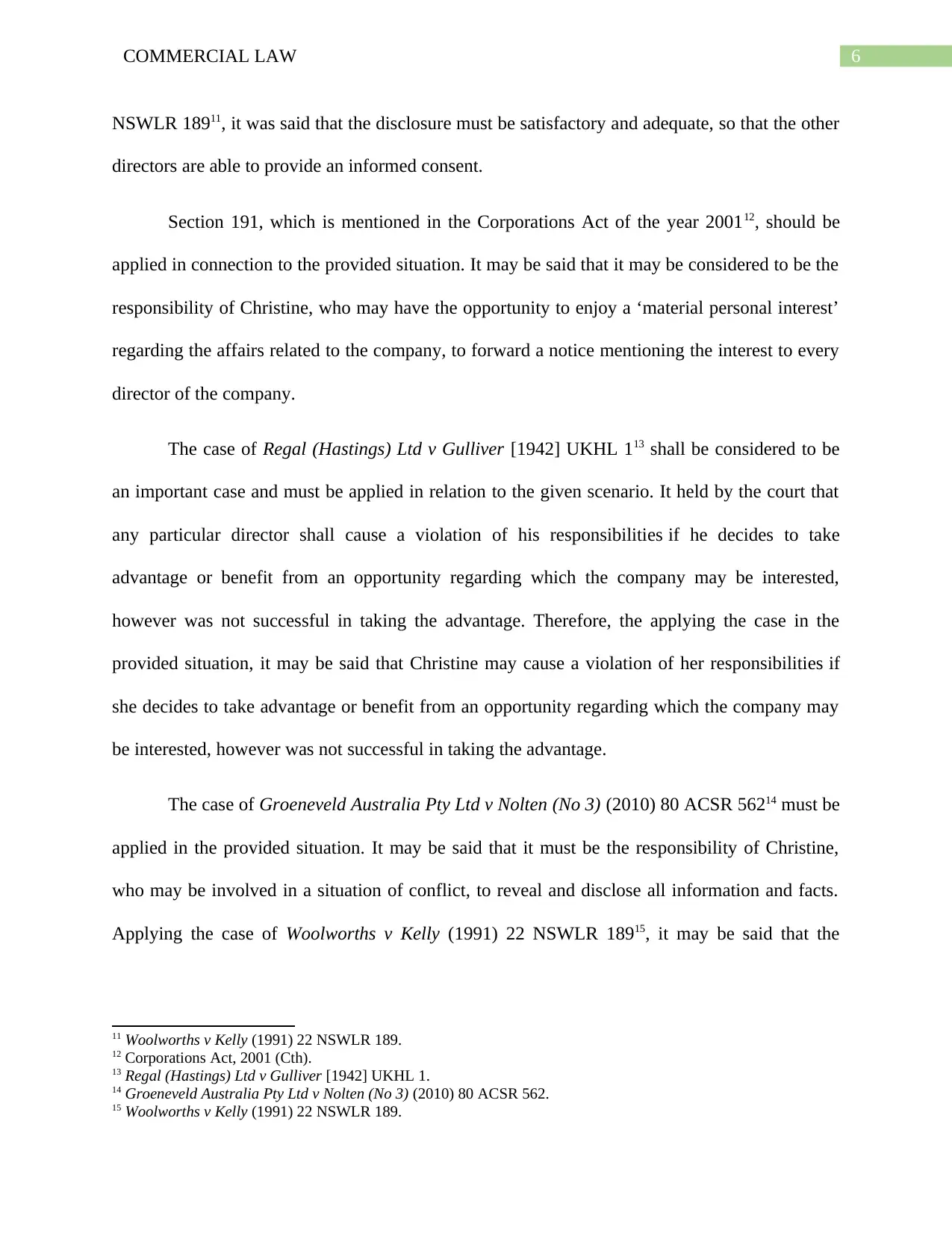
6COMMERCIAL LAW
NSWLR 18911, it was said that the disclosure must be satisfactory and adequate, so that the other
directors are able to provide an informed consent.
Section 191, which is mentioned in the Corporations Act of the year 200112, should be
applied in connection to the provided situation. It may be said that it may be considered to be the
responsibility of Christine, who may have the opportunity to enjoy a ‘material personal interest’
regarding the affairs related to the company, to forward a notice mentioning the interest to every
director of the company.
The case of Regal (Hastings) Ltd v Gulliver [1942] UKHL 113 shall be considered to be
an important case and must be applied in relation to the given scenario. It held by the court that
any particular director shall cause a violation of his responsibilities if he decides to take
advantage or benefit from an opportunity regarding which the company may be interested,
however was not successful in taking the advantage. Therefore, the applying the case in the
provided situation, it may be said that Christine may cause a violation of her responsibilities if
she decides to take advantage or benefit from an opportunity regarding which the company may
be interested, however was not successful in taking the advantage.
The case of Groeneveld Australia Pty Ltd v Nolten (No 3) (2010) 80 ACSR 56214 must be
applied in the provided situation. It may be said that it must be the responsibility of Christine,
who may be involved in a situation of conflict, to reveal and disclose all information and facts.
Applying the case of Woolworths v Kelly (1991) 22 NSWLR 18915, it may be said that the
11 Woolworths v Kelly (1991) 22 NSWLR 189.
12 Corporations Act, 2001 (Cth).
13 Regal (Hastings) Ltd v Gulliver [1942] UKHL 1.
14 Groeneveld Australia Pty Ltd v Nolten (No 3) (2010) 80 ACSR 562.
15 Woolworths v Kelly (1991) 22 NSWLR 189.
NSWLR 18911, it was said that the disclosure must be satisfactory and adequate, so that the other
directors are able to provide an informed consent.
Section 191, which is mentioned in the Corporations Act of the year 200112, should be
applied in connection to the provided situation. It may be said that it may be considered to be the
responsibility of Christine, who may have the opportunity to enjoy a ‘material personal interest’
regarding the affairs related to the company, to forward a notice mentioning the interest to every
director of the company.
The case of Regal (Hastings) Ltd v Gulliver [1942] UKHL 113 shall be considered to be
an important case and must be applied in relation to the given scenario. It held by the court that
any particular director shall cause a violation of his responsibilities if he decides to take
advantage or benefit from an opportunity regarding which the company may be interested,
however was not successful in taking the advantage. Therefore, the applying the case in the
provided situation, it may be said that Christine may cause a violation of her responsibilities if
she decides to take advantage or benefit from an opportunity regarding which the company may
be interested, however was not successful in taking the advantage.
The case of Groeneveld Australia Pty Ltd v Nolten (No 3) (2010) 80 ACSR 56214 must be
applied in the provided situation. It may be said that it must be the responsibility of Christine,
who may be involved in a situation of conflict, to reveal and disclose all information and facts.
Applying the case of Woolworths v Kelly (1991) 22 NSWLR 18915, it may be said that the
11 Woolworths v Kelly (1991) 22 NSWLR 189.
12 Corporations Act, 2001 (Cth).
13 Regal (Hastings) Ltd v Gulliver [1942] UKHL 1.
14 Groeneveld Australia Pty Ltd v Nolten (No 3) (2010) 80 ACSR 562.
15 Woolworths v Kelly (1991) 22 NSWLR 189.
Paraphrase This Document
Need a fresh take? Get an instant paraphrase of this document with our AI Paraphraser
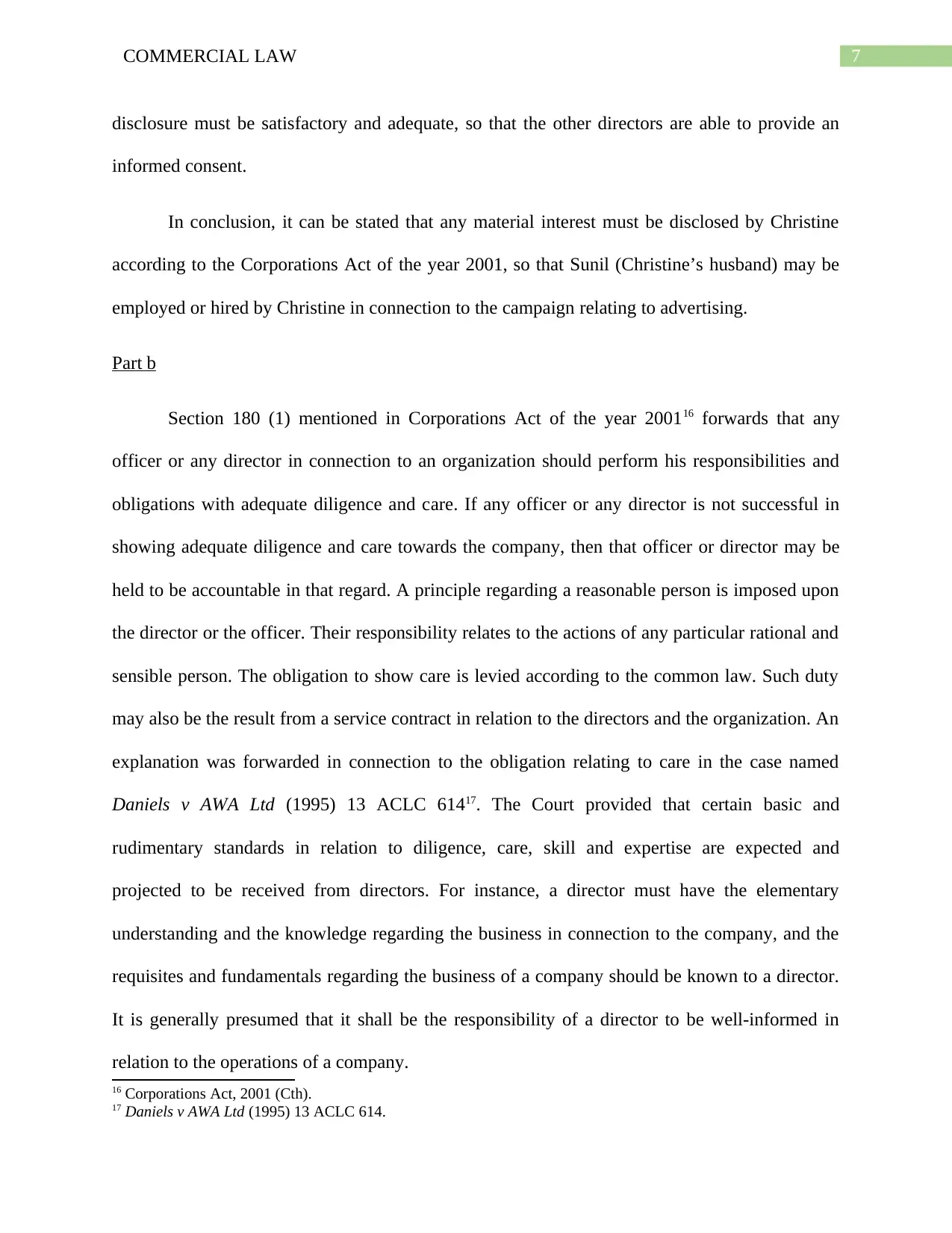
7COMMERCIAL LAW
disclosure must be satisfactory and adequate, so that the other directors are able to provide an
informed consent.
In conclusion, it can be stated that any material interest must be disclosed by Christine
according to the Corporations Act of the year 2001, so that Sunil (Christine’s husband) may be
employed or hired by Christine in connection to the campaign relating to advertising.
Part b
Section 180 (1) mentioned in Corporations Act of the year 200116 forwards that any
officer or any director in connection to an organization should perform his responsibilities and
obligations with adequate diligence and care. If any officer or any director is not successful in
showing adequate diligence and care towards the company, then that officer or director may be
held to be accountable in that regard. A principle regarding a reasonable person is imposed upon
the director or the officer. Their responsibility relates to the actions of any particular rational and
sensible person. The obligation to show care is levied according to the common law. Such duty
may also be the result from a service contract in relation to the directors and the organization. An
explanation was forwarded in connection to the obligation relating to care in the case named
Daniels v AWA Ltd (1995) 13 ACLC 61417. The Court provided that certain basic and
rudimentary standards in relation to diligence, care, skill and expertise are expected and
projected to be received from directors. For instance, a director must have the elementary
understanding and the knowledge regarding the business in connection to the company, and the
requisites and fundamentals regarding the business of a company should be known to a director.
It is generally presumed that it shall be the responsibility of a director to be well-informed in
relation to the operations of a company.
16 Corporations Act, 2001 (Cth).
17 Daniels v AWA Ltd (1995) 13 ACLC 614.
disclosure must be satisfactory and adequate, so that the other directors are able to provide an
informed consent.
In conclusion, it can be stated that any material interest must be disclosed by Christine
according to the Corporations Act of the year 2001, so that Sunil (Christine’s husband) may be
employed or hired by Christine in connection to the campaign relating to advertising.
Part b
Section 180 (1) mentioned in Corporations Act of the year 200116 forwards that any
officer or any director in connection to an organization should perform his responsibilities and
obligations with adequate diligence and care. If any officer or any director is not successful in
showing adequate diligence and care towards the company, then that officer or director may be
held to be accountable in that regard. A principle regarding a reasonable person is imposed upon
the director or the officer. Their responsibility relates to the actions of any particular rational and
sensible person. The obligation to show care is levied according to the common law. Such duty
may also be the result from a service contract in relation to the directors and the organization. An
explanation was forwarded in connection to the obligation relating to care in the case named
Daniels v AWA Ltd (1995) 13 ACLC 61417. The Court provided that certain basic and
rudimentary standards in relation to diligence, care, skill and expertise are expected and
projected to be received from directors. For instance, a director must have the elementary
understanding and the knowledge regarding the business in connection to the company, and the
requisites and fundamentals regarding the business of a company should be known to a director.
It is generally presumed that it shall be the responsibility of a director to be well-informed in
relation to the operations of a company.
16 Corporations Act, 2001 (Cth).
17 Daniels v AWA Ltd (1995) 13 ACLC 614.
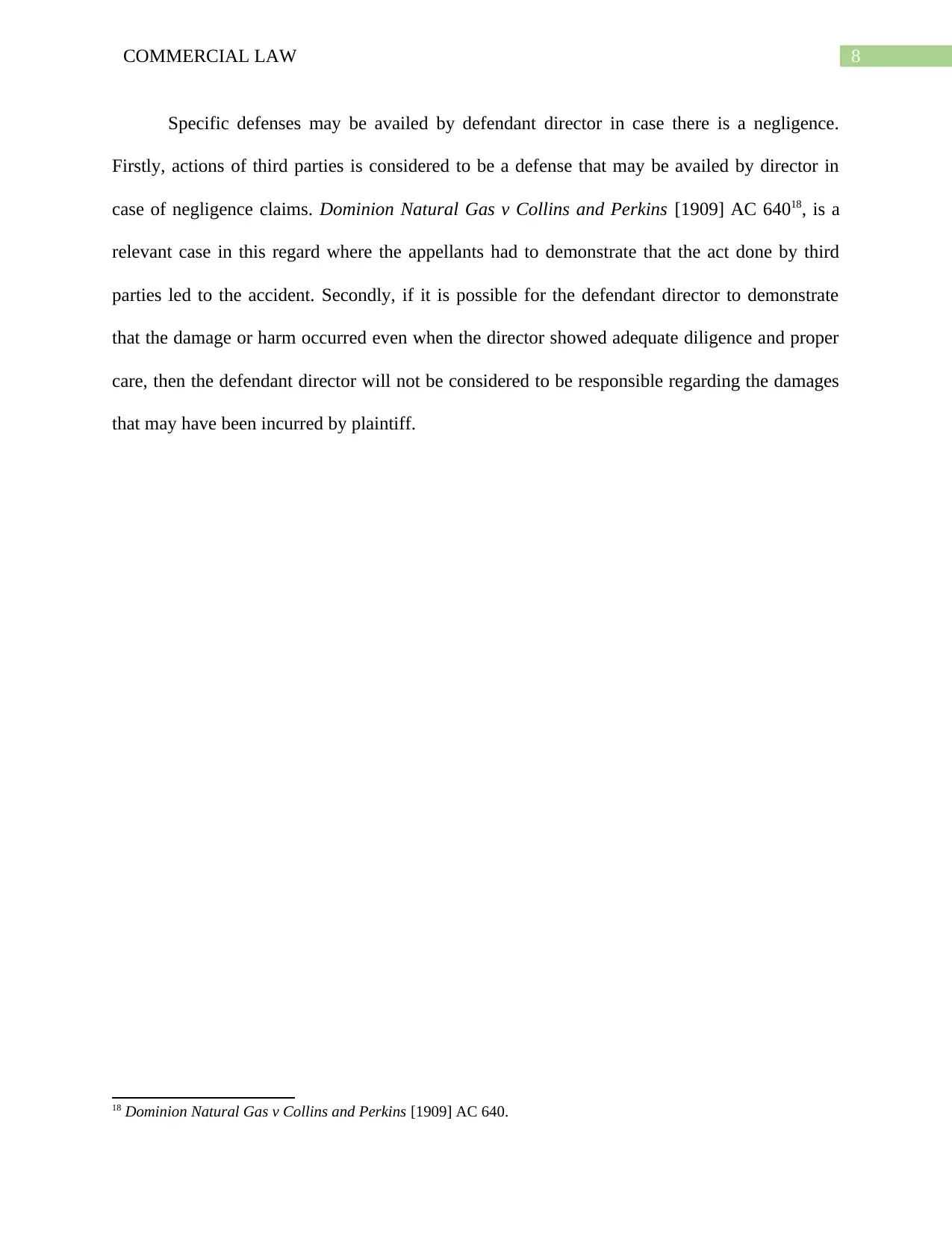
8COMMERCIAL LAW
Specific defenses may be availed by defendant director in case there is a negligence.
Firstly, actions of third parties is considered to be a defense that may be availed by director in
case of negligence claims. Dominion Natural Gas v Collins and Perkins [1909] AC 64018, is a
relevant case in this regard where the appellants had to demonstrate that the act done by third
parties led to the accident. Secondly, if it is possible for the defendant director to demonstrate
that the damage or harm occurred even when the director showed adequate diligence and proper
care, then the defendant director will not be considered to be responsible regarding the damages
that may have been incurred by plaintiff.
18 Dominion Natural Gas v Collins and Perkins [1909] AC 640.
Specific defenses may be availed by defendant director in case there is a negligence.
Firstly, actions of third parties is considered to be a defense that may be availed by director in
case of negligence claims. Dominion Natural Gas v Collins and Perkins [1909] AC 64018, is a
relevant case in this regard where the appellants had to demonstrate that the act done by third
parties led to the accident. Secondly, if it is possible for the defendant director to demonstrate
that the damage or harm occurred even when the director showed adequate diligence and proper
care, then the defendant director will not be considered to be responsible regarding the damages
that may have been incurred by plaintiff.
18 Dominion Natural Gas v Collins and Perkins [1909] AC 640.
⊘ This is a preview!⊘
Do you want full access?
Subscribe today to unlock all pages.

Trusted by 1+ million students worldwide
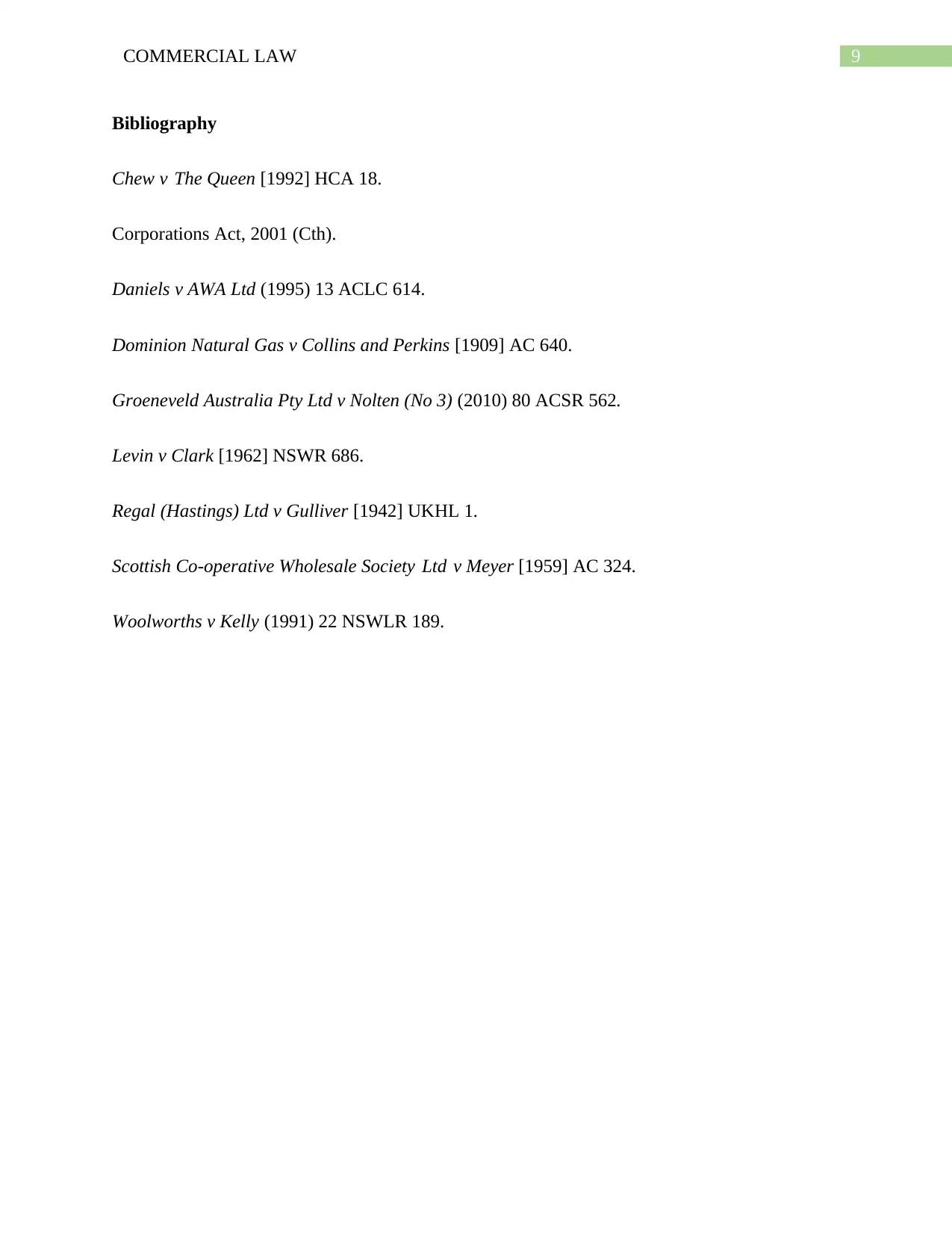
9COMMERCIAL LAW
Bibliography
Chew v The Queen [1992] HCA 18.
Corporations Act, 2001 (Cth).
Daniels v AWA Ltd (1995) 13 ACLC 614.
Dominion Natural Gas v Collins and Perkins [1909] AC 640.
Groeneveld Australia Pty Ltd v Nolten (No 3) (2010) 80 ACSR 562.
Levin v Clark [1962] NSWR 686.
Regal (Hastings) Ltd v Gulliver [1942] UKHL 1.
Scottish Co-operative Wholesale Society Ltd v Meyer [1959] AC 324.
Woolworths v Kelly (1991) 22 NSWLR 189.
Bibliography
Chew v The Queen [1992] HCA 18.
Corporations Act, 2001 (Cth).
Daniels v AWA Ltd (1995) 13 ACLC 614.
Dominion Natural Gas v Collins and Perkins [1909] AC 640.
Groeneveld Australia Pty Ltd v Nolten (No 3) (2010) 80 ACSR 562.
Levin v Clark [1962] NSWR 686.
Regal (Hastings) Ltd v Gulliver [1942] UKHL 1.
Scottish Co-operative Wholesale Society Ltd v Meyer [1959] AC 324.
Woolworths v Kelly (1991) 22 NSWLR 189.
1 out of 10
Related Documents
Your All-in-One AI-Powered Toolkit for Academic Success.
+13062052269
info@desklib.com
Available 24*7 on WhatsApp / Email
![[object Object]](/_next/static/media/star-bottom.7253800d.svg)
Unlock your academic potential
Copyright © 2020–2026 A2Z Services. All Rights Reserved. Developed and managed by ZUCOL.





